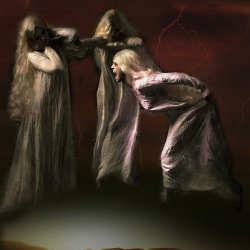Point of Departure (Three Minute Theatre, Manchester)
A good effort, but lacks the emotional core to see it through, says David Cunningham.
A group of people in an enclosed space menaced by anonymous external forces is a standard feature of suspense movies by Howard Hawks and John Carpenter.

© Three Minute Theatre
In Point of Departure writer and co-director John Topliff uses the template as a means of examining the internal conflict of the characters and also for shock value.
Soldiers Taylor (Al Akande) and Collins (Nik Grundison) are the last to be evacuated from the tiny republic of Khoto that has descended into chaos. The arrival of comedian Rourke (Aiden J. Harvey) acts as a catalyst provoking all of the characters to look back on traumatic events in their lives.
There are a lot of contrivances in Point of Departure. So much so, that it's hard to determine how the events at the airport compel introspection. With the exception of the incident recalled by Taylor none seems to have any direct relevance to the situation in which the characters find themselves. As a result there is no sense of the characters, except Taylor, seeking redemption.
Rather than generate suspense Topliff sets out to shock but to be effective the technique requires novelty. Audiences are now inured to shock by media reports of sickening violence in far-off countries and to once-loved celebrities being revealed as sexual predators. We have seen it all and it really is hard for authors to compete with reality. At times Topliff has to fall back on using potentially offensive politically incorrect phrases in his dialogue to try and generate outrage.
The play is described as being in development and Topliff and co-director Gina T. Frost seem to be trying out a variety of styles but unable to settle on one. The cast respond well to the challenges this involves moving seamlessly from a naturalistic opening to the more theatrical style of stepping forward to perform monologues or switching into different characters. However, the lack of consistency, at times, moves towards self-indulgence.
Aiden J. Harvey performs what looks likely a largely improvised comedy routine that is certainly funny but serves no dramatic purpose. As the author and directors have opted to avoid developing suspense the routine does not provide the necessary relief from a mood of oppression.
The play ends with a moment straight out of a horror movie that is certainly striking but out of place with what has gone before.
There is potential for a powerful production in Point of Departure but currently the lack of an overall vision limits the emotional impact of the play.
Point of Departure runs at the Three Minute Theatre until 16 August.












